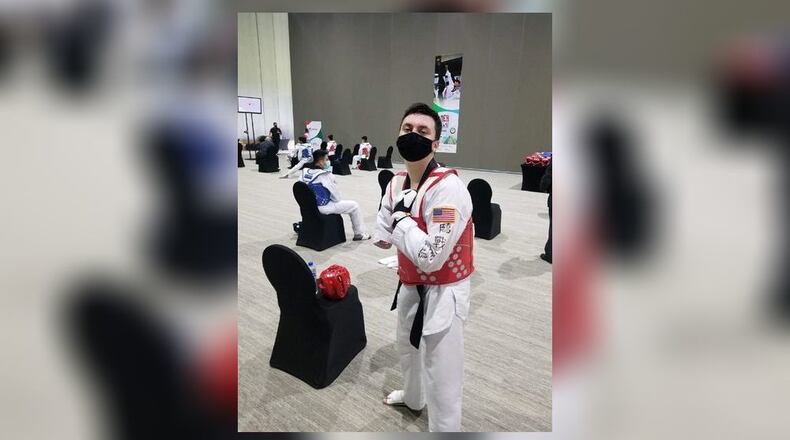Again, no right arm.
“It was like they were trying to find something that wasn’t there,” she said. “This was my first child. You just expect 10 fingers, 10 toes. It was a little shocking, upsetting.”
Coming to the realization she was going to deliver a son born without an arm due to amniotic band syndrome, she vowed to give him all the opportunities she could.
“We’re going to raise him no different,” she said of her thinking at the time. “He can do anything he puts his mind to.”
Now, 15 years later, Austin Osner is proving his mother right.
He recently returned to Fairfield after winning a gold medal at the AAU Taekwondo National Championships at the MGM Grand in Las Vegas.
Six weeks ago, he won a bronze medal in Taekwondo at the Pan Am Paralympic Games in Cancun, Mexico. He entered the tournament as an unseeded unknown.
He hopes to make the U.S. National Paralympic team and compete against the world at the 2024 Paralympics in Paris or the 2028 Paralympics in Los Angeles.
Osner, who turns 16 next month, is about to begin his junior year at Ohio Virtual Academy, an online charter school. He was bullied in public schools and enrolled in OVA, his mother said.
She said the “silver lining” is the online school allows him to complete his school work remotely and continue his extensive training and competition schedule.
He trains three days a week, meets with his personal trainer twice a week, and he has a boxing coach and yoga instructor. His coach Brad Deminck, who specializes in para athletes, runs the Lakeshore Taekwondo Academy in Grand Haven, Mich.
A single mother, McGinn takes her two children, Austin and 15-year-old Jordan, to Grand Haven about six times a year.
“There is a lot that goes on behind the scenes,” his mother said.
When Osner began competing, his mother was shaking too much to take video and photos. She was worried about her son being seriously injured. But a recent rule change in the sport eliminated head contact and that “took nervous off my plate,” she said.
When Osner was introduced to Taekwondo he competed against able-bodied athletes but now competes as a para athlete. Whether the athletes have one or two arms, the goal is the same: Win.
“You fight your heart out to be the better fighter,” he said. “Every time you step in the ring, there are risk factors. You just have to try to forget that and take care of business.”
As the wins have piled up, Osner realizes there’s a responsibility that comes with the medals. He has become a teenage role model for other kids.
“It’s great to motivate other people,” he said. “People have told me they want to be like me. That’s been a big factor. It pushes me more and more and keeps me going.”
Osner sounds older than his age. Maybe it’s the world travel, the upbringing or the mental preparation it takes to compete at an international level.
When Osner was in kindergarten, he realized he was made different than the other kids in his class.
“You put the puzzles together and know you’re not quite the same,” he said. “I never knew why. Why was I different? But my family and friends supported me. I never wanted to be treated different. I wanted the same expectations as someone with two arms.”
With that, he handed the phone back to his mother who was listening.
“He consistently amazes me every day,” she said.
About the Author

